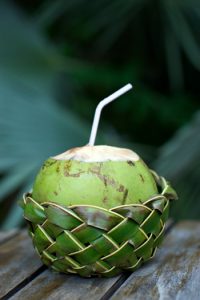Some people consider coconut water to be just a refreshing drink, perfect on a hot day. Coconut oil is wildly popular these days and has many health and beauty uses. However, coconut water is also gaining more appreciation, especially as a natural alternative for sports drinks.
The clear liquid found inside green coconuts is now marketed as a sports drink, and you can easily find it in gyms and grocery stores. Can coconut water help athletes rehydrate and replenish the electrolytes lost during a workout, just like a sports drink can?
Summary
- ? Coconut Water Popularity: Coconut water is gaining traction, especially as a natural alternative to sports drinks. It can be found in gyms and grocery stores.
- ? Nutritional Content: Coconut water is low in calories (45 cal/240 grams) and sugars (6.3g), but it is high in potassium (600 mg). It also contains other electrolytes like magnesium, calcium, vitamins, and minerals.
- ? Coconut Water vs. Sports Drinks: Studies show coconut water has significantly more potassium and less sodium than popular sports drinks like Gatorade or Powerade. Although coconut water alone may not be ideal for high-intensity workouts due to its low sodium content, adding sodium can make it as effective as commercial sports drinks in terms of rehydration.
- ❤️ Health Benefits: Preliminary research suggests potential benefits of coconut water, such as reducing systolic blood pressure in hypertensive patients. Natural coconut water has less sugar and no artificial additives than commercial sports drinks.
- ? Natural Choice: Coconut water, especially when sodium-enriched, can be a healthier choice to replace typical sports drinks, fruit juices, and sodas.

Coconut water nutritional information (1 cup/240 grams)
Calories – Coconut water is low in calories, as 1 cup only gives you 45 calories, a desirable trait if you’re looking to use it as a sports drink or to replace the plain, boring water now and then.
Water – Out of 240 grams, 228 are water (about 95%) so in terms of hydration, you need not worry if you choose coconut water over a sports drink or plain H2O.
Sugars – There are only 6.3 grams of sugar in a cup of coconut water, which makes it a good alternative to drinking fruit juices and sodas. The story is different if you choose flavored coconut water, which usually contains added sugars.
Potassium – One serving of coconut water has about 600 mg of potassium, which is 17% of the daily recommended value. Anyone who works out knows how uncomfortable muscle cramps are; potassium can help you eliminate them. Also, the typical Western diet doesn’t include enough potassium to meet the daily requirements.
Sodium – Coconut water contains low amounts of sodium, only 250 mg per serving. Considering most people have sodium-rich diets, the fact that coconut water doesn’t contain too much seems beneficial. In terms of replenishing sodium lost through sweat after an intense workout, coconut water doesn’t provide enough.
Other electrolytes – Besides sodium and potassium, coconut water contains other electrolytes such as magnesium (60 mg/serving) and calcium (57mg/serving). However, sodium and potassium remain the top electrolytes lost through sweat.
Vitamins – While coconut water has only low amounts of B vitamins, one cup gives you 5.8 mg of vitamin C which is 10% of the daily recommended value.
Minerals – On top of the electrolytes essential for post-workout recovery, coconut water can give you 17% of the daily value of manganese and low amounts of iron, phosphorous, copper, selenium and zinc.

Coconut water vs. sports drinks
The growing hype around coconut water turned into the perfect subject for research. A team of scientists led by Dr. Chhandashri Bhattacharya from Indiana University Southeast, analyzed coconut water and two popular sports drinks, Gatorade and Powerade. They found all three drinks had similar amounts of carbohydrates and magnesium. However, 1 liter of coconut water had up to 1500 mg of potassium and 400 mg of sodium, while 1 liter of Gatorade or Powerade had about 300 mg of potassium and 600 mg of sodium. Plus, coconut water is richer in other nutrients compared to sports drinks. So the main difference is coconut water has much more potassium but less sodium than the analyzed sports drinks.
This means coconut water may not be a good sports drink alternative for those who engage in strenuous exercise that causes a lot of sweating, as more sodium is lost through sweat than potassium, and coconut water doesn’t have enough to replenish the lost amount.
Another study, conducted by Malaysian researchers analyzed post-workout rehydration using plain water, coconut water, and a sports drink. They monitored 8 healthy men during three runs performed in the heat. There was one week of rest period between the runs. They measured hydration levels before the runs and after the runs, during the two-hour rehydration periods, during which the subjects received either plain water, coconut water or a sports drink, representing 120% of the fluid loss. They found all three drinks were equally effective for rehydration. However, coconut water seemed easier to ingest in larger amounts and caused less nausea and upset stomachs than the other two drinks.
It seems coconut water is a viable sports drink alternative to rehydrate after a low to moderate-intensity workout. There’s a common sense question you might be asking yourself: If coconut water’s only shortage in terms of becoming an adequate sports drink is its low sodium content, then why not add some more?
The truth is, you can….and a 2007 study already analyzed the efficiency of post-exercise rehydration using sodium-enriched coconut water. They compared it with plain water, fresh young coconut water, sports drink,s and sodium-enriched fresh young coconut water. The sodium-enriched coconut water seemed just as good as the sports drink for whole-body rehydration. Still, it was easier to tolerate, causing less nausea and upset stomach than plain water and the sports drink.

Coconut water health benefits
There’s ongoing research on the potential health benefits of coconut water, but we have very few findings so far without enough scientific support. Small studies have shown coconut water can lower systolic blood pressure in hypertensive patients, and there might be a link between coconut water intake and a lower rate of heart attacks. However, we can consider coconut water healthy, judging its vitamin and mineral content.
Because it hasn’t been studied well enough, we don’t know if drinking coconut water regularly has any side effects, although it seems quite safe.
Sodium-enriched or not, there is still a significant difference between coconut water and sports drinks. Coconut water in its natural, unaltered state, contains less sugar than the typical sports drink and doesn’t have any artificial flavors and colorants. Regarding a healthy diet, choosing coconut water to replace commercial sports drinks, fruit juices, and sodas is the better choice.
